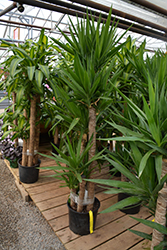It's all about ...
plants

Height: 20 feet
Spread: 15 feet
Sunlight:
![]()
![]()
Hardiness Zone: 9a
Other Names: Stick Yucca, Giant Yucca, Cane Yucca
Description:
A stunning addition to the garden or patio; features long green, sword-like leaves and beautiful clusters of nodding white bell flowers in the spring and summer; a low maintenance selection that prefers bright indirect sunlight
Ornamental Features
Spineless Yucca features bold panicles of white bell-shaped flowers rising above the foliage from late spring to late summer. It has attractive green evergreen foliage. The sword-like leaves are highly ornamental and remain green throughout the winter.
Landscape Attributes
Spineless Yucca is a multi-stemmed evergreen shrub with an upright spreading habit of growth. Its relatively coarse texture can be used to stand it apart from other landscape plants with finer foliage.
This shrub will require occasional maintenance and upkeep, and is best pruned in late winter once the threat of extreme cold has passed. It is a good choice for attracting bees and hummingbirds to your yard. It has no significant negative characteristics.
Spineless Yucca is recommended for the following landscape applications;
- Accent
- Mass Planting
- Hedges/Screening
- General Garden Use
- Container Planting
Planting & Growing
Spineless Yucca will grow to be about 20 feet tall at maturity, with a spread of 15 feet. It has a low canopy with a typical clearance of 2 feet from the ground, and is suitable for planting under power lines. It grows at a slow rate, and under ideal conditions can be expected to live for approximately 20 years.
This shrub does best in full sun to partial shade. It prefers dry to average moisture levels with very well-drained soil, and will often die in standing water. It is considered to be drought-tolerant, and thus makes an ideal choice for xeriscaping or the moisture-conserving landscape. It is not particular as to soil pH, but grows best in sandy soils, and is able to handle environmental salt. It is somewhat tolerant of urban pollution. This species is not originally from North America.
Spineless Yucca makes a fine choice for the outdoor landscape, but it is also well-suited for use in outdoor pots and containers. Its large size and upright habit of growth lend it for use as a solitary accent, or in a composition surrounded by smaller plants around the base and those that spill over the edges. It is even sizeable enough that it can be grown alone in a suitable container. Note that when grown in a container, it may not perform exactly as indicated on the tag - this is to be expected. Also note that when growing plants in outdoor containers and baskets, they may require more frequent waterings than they would in the yard or garden. Be aware that in our climate, most plants cannot be expected to survive the winter if left in containers outdoors, and this plant is no exception. Contact our experts for more information on how to protect it over the winter months.
This plant is not reliably hardy in our region, and certain restrictions may apply; contact the store for more information.
